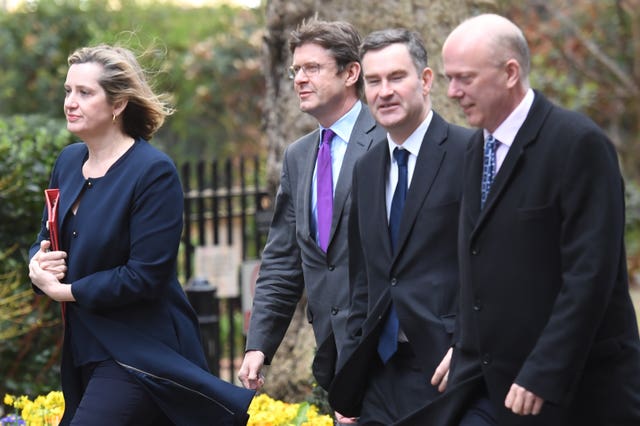May resists call from Brexiteers to sack rebel ministers
The Prime Minister rebuked Cabinet ministers who abstained on a key Brexit motion but they remain in their posts.

Theresa May has resisted calls to sack rebel Cabinet ministers after the no-deal Brexit vote left her authority in shreds.
The Prime Minister is understood to have made clear her displeasure at the actions of senior ministers around the Cabinet table and demanded more loyalty after Wednesday night’s chaotic scenes in the Commons.
But backbench Tory MPs – including former ministers – called for heads to roll and urged Mrs May to restore discipline within the Government.
Among those who abstained on the vote to reject a no-deal Brexit were Work and Pensions Secretary Amber Rudd, Scottish Secretary David Mundell, Justice Secretary David Gauke and Business Secretary Greg Clark.
Energy Minister Claire Perry, who attends Cabinet, and other junior ministers also abstained.
At a meeting of senior ministers on Thursday, a Cabinet source said Mrs May made clear she was “less than impressed with (the) Remainers” and “demanded more loyalty”.
But Downing Street sources denied a suggestion circulating at Westminster that the Prime Minister “went batshit” at the rebels during the Cabinet meeting.

Ms Rudd used a letter to constituents to defend her decision – and appeared to blame hardliners in the European Research Group for derailing the Prime Minister’s Brexit plans.
The Work and Pensions Secretary said a no-deal Brexit would “do generational damage to our economy and security”.
She added that if Brexit is delayed “it is because many of my colleagues in the Commons have refused to join those of us who have consistently voted for the Prime Minister’s good deal”.
Sarah Newton quit her ministerial role at the Department for Work and Pensions after defying the three-line whip by voting to reject crashing out of the European Union without a deal under any circumstances.
Paul Masterton resigned as a Home Office ministerial aide in order to vote for the motion rejecting a no-deal Brexit.
Mrs Newton said she “resigned from the Government so that I could vote for a motion that honours my commitment to my constituents, to leave the EU with ‘a deal’.”
Twelve other ministers abstained in the vote on the Government motion, including four members of Theresa May’s Cabinet.
The Commons voted 312 to 308 – a majority of four – in favour of a cross-party amendment, tabled by Dame Caroline Spelman, rejecting a no-deal Brexit.
The vote was later confirmed by a more emphatic 321 votes to 278, overriding a Government motion tabled by Mrs May which would have rejected no-deal on the scheduled date of March 29 but left it on the table for other times.
Other minsters who abstained included Robert Buckland, Alistair Burt, Tobias Ellwood, Richard Harrington, Margot James, Anne Milton and Stephen Hammond.
Asked if he was given assurances that he would keep his job if he abstained, Mr Hammond told Today: “I personally hadn’t, but I believe some colleagues may have been.”
Another rebel told the Press Association they were not told “anything other than to vote against the amended motion” but abstained anyway because “we were promised free votes and didn’t get them”.
But Nigel Evans, joint executive secretary of the backbench 1922 Committee, said Mrs May must regain control of her party.
“Her authority was openly defied by Cabinet ministers and other ministers,” he said.
“She needs to reassert her authority. We have to have collective responsibility in government, otherwise it just simply doesn’t work.”
Crispin Blunt said: “They should have resigned. If you’re not going to support the Government’s position then fair enough, but there’s a deal.
“If you’re in the Government, then you vote the Government’s position.”





